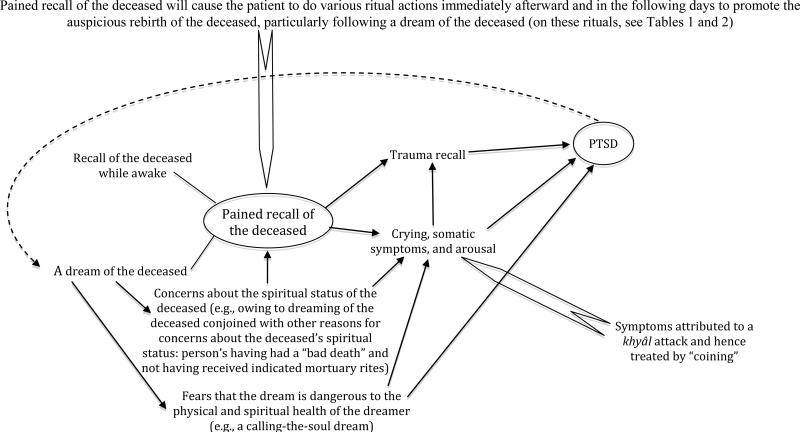Figure 1.
Bereavement – PTSD Model as Applied to the Cambodian Genocide Survivor: The Central Role of Dreams. This model shows how bereavement and PT SD mutually worsen one another and the key role of dreams of the deceased in this process. Pained recall of the deceased may occ ur while awake or while dreaming. Dreams of the deceased will give rise not only to concerns about the spiritual status of the deceased but also to fears that the dream is dangerous to the dreamer, e.g., if the dreamer follows the deceased in the dream, the dreamer's soul may be permanently displaced from the body.
Recall of the deceased will cause trauma recall by several mechanisms: (1) by bringing to mind the manner of the person's dea th, for example, having seen a parent taken away to be killed by the Kh mer Rouge, which may then evoke various trauma events; (2) by evoking a sense of loss and sadness, for example, the sense of loss owing to the person's death, which will recall other losses; (3) by causing concerns about the spiritual state of the deceased; (4) by evoking the Pol Pot period if the recall is a dream in which the relative seems hungry or suffering in some way that resembles conditions in the Pol Pot period; (5) by creating a sense of imminent danger, for example, if the recall is a dream that is thought to be dangerous; and (6) by bringing about somatic symptoms and dysphoria that then trigger trauma recall, such as when palpitations recall trauma memories encoded in memory by that somatic symptom.
Thus, recall of the deceased will result in trauma recall, arousal, and fear, all of which will worsen PTSD. Worsened PTSD will result in more nightmares, which may take the form of dreams of the deceased, creating a vicious cycle of worsening. Somatic symptoms and distress cause d by recall of the d eceased will tend to be attributed to a khyâl attack and will be treated by coining. Owing to concerns about the spiritual status of the deceased, the patient may do vario us ritual actions both immediately after recall of the deceased and in the following days to promote the auspicious rebirth of the deceased.

